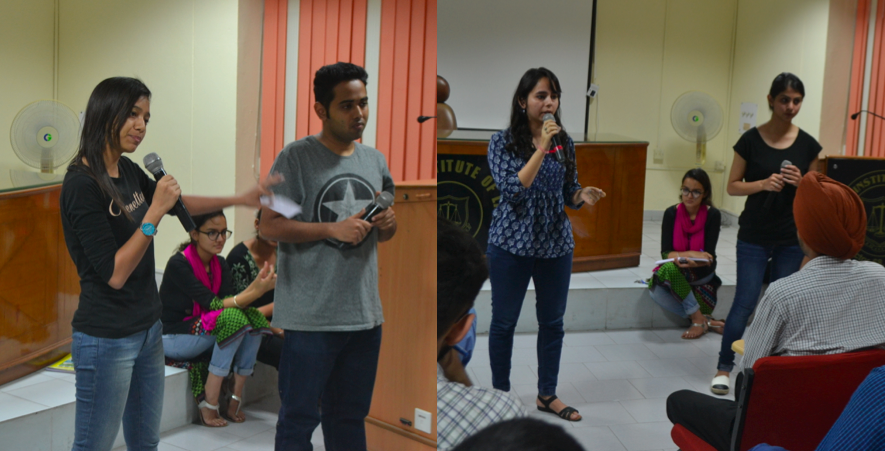They all came. They walked. They ran. They jumped. They came on wheelchairs and crutches; but they came.
Session 1: Moot
Despite the painfully long day, we were excited about the Symposium Session later. (No kidding. We were all there with faces fresh as ever.) As we trudged into the seminar hall, we were pleasantly surprised to know that we’d be addressed by our Institute Prefect, Chitralekha Katoch and along with her, Manveen Malhi.
Initially, it was all about our upcoming and future moots, because, studies (and possible lawyering career) first.
So, talking to us about the moots, we were told that there are 3 members; 2 speakers and 1 researcher. A moot is, basically, a court simulation. There are propositions and legal questions and facts (so many facts) and contentions and memorials and compendiums and whole lot of things that we were, frankly, too dim to understand.

The Moot Process was explained to us in brief bullet points.
- Eliminations are very important.
- Read everything. Thoroughly. Enough times to be able to recite them in your sleep.
- Try and use SCC Online and Manupatra. Don’t make up case laws. (Raj v. Simran)
- Research is the most crucial aspect of any mooting career. (Take notes, budding lawyers.)
- For research purposes, the library has a lot to offer. Try not to get lost in it. (Haha)
- Quote statements from case laws.
- And know the case laws like the back of your hand.
- Don’t be aggressive while arguing.
- Mannerism has 20 marks, so, behave.
- DO NOT USE WIKIPEDIA (or even R.K. Bangia). Wikipedia arguments ensure your destruction in the court of law.
- Know the jurisdiction of your case and the way to address judges.
(And now some incentives) - The college pays for EVERYTHING (mostly).
- Research IDs are assigned to you which gives you free and unlimited access to Wi-Fi. (Tears)
- The Research Cell, where the teams work, has ACs and heaters. (Cameras too, mind you).
- YOU EARN MONEY THROUGH MOOTS. Get in it, just to win it.
- Mooting is addictive, so even if you are scared, you will cross that bridge.
Session 2: Cultural Events

In the second session, Manini Aswal, the Cultural Prefect and Alankar Sharma briefed the students about the cultural affairs that are to take place in the college in the coming months.
They laid emphasis on the AWES fest, during the course of which, you can even ask for the universe, and apparently, you get it. They insisted the students participate in as many events as possible, for recreation is a bodily necessity.
And remember, when out for fests, ‘If you get in trouble, don’t tell them you are from AIL.’
The write up was prepared by Riya Wasade.
